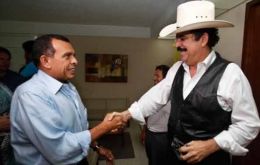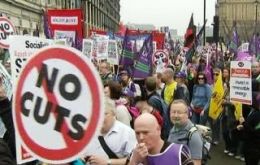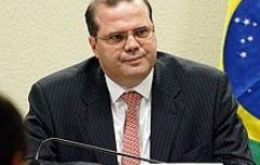MercoPress. South Atlantic News Agency
Stories for March 2011
-
Sunday, March 27th 2011 - 04:47 UTC
Honduras closer to normalization allows return of former president Zelaya

Former Honduran President Manuel Zelaya says he won't return to Honduras for fear of being killed. Zelaya says he is in danger because “there are people who want to liquidate me and are still alive, and they have great power.”
-
Sunday, March 27th 2011 - 04:43 UTC
Massive march in London to protest planned measures to cut budget deficit

In possibly the biggest protests since those against the Iraq war in February 2003, organizers say up to 250,000 people took to the streets of London on Saturday to show their frustration with planned austerity measures designed to cut a record budget deficit.
-
Sunday, March 27th 2011 - 04:37 UTC
President Obama’s weak message to Latin America

On Thursday March 24 The Washington Post published a rather critical editorial on President Barack Obama recent visit to Brazil, Chile and El Salvador.
-
Saturday, March 26th 2011 - 10:41 UTC
Uruguay admits concern over inflation raises benchmark interest to 7.5%

Uruguay's central bank this week surprised local economists and raised its benchmark interest rate 100 base points, one percentage point to 7.5%, in an attempt to help combat accelerating inflation which is beyond the government's target range.
-
Saturday, March 26th 2011 - 10:38 UTC
Billionaire Buffet advice: avoid long term fixed-income investment in US dollars

Billionaire Warren Buffet who urged United States in 2009 to guard against inflation, said investors should avoid long-term fixed-income bets in US dollars because the currency’s purchasing power will decline.
-
Saturday, March 26th 2011 - 10:36 UTC
Second Fed governor in a week against extending US stimulative policies

The Federal Reserve has less need to support an improving US economy beyond the 600 billion dollars Treasury purchase plan already in place, and any changes to the central bank’s stimulative policies should be considered some time after the program ends, said Charles Evans, , president of the Fed’s regional bank in Chicago.
-
Saturday, March 26th 2011 - 10:30 UTC
Unrest extends across Syria including Damascus; security forces shoot on protestors

Protests have been staged in towns and cities across Syria, including the capital Damascus, a day after the government announced limited changes. Unconfirmed reports said a number of people had been killed in at least three separate protests.
-
Saturday, March 26th 2011 - 09:03 UTC
BBC changes 70 year Mandarin service for BBC Chinese language websites

BBC Chinese Service has made its final radio broadcast in Mandarin after nearly 70 years. Shortwave programming in Mandarin is a casualty of spending cuts announced by the BBC World Service in January.
-
Saturday, March 26th 2011 - 08:57 UTC
Brazil expected to raise benchmark interest rate as inflation “worsens”

Brazilian Central bank President Alexandre Tombini admitted inflation forecasts may “worsen”. Consumer prices in the 12 months through mid-March rose 6.13%, the biggest jump in more than two years.
-
Saturday, March 26th 2011 - 08:53 UTC
WTO rules US is illegally taxing imported Brazilian frozen orange juice

The World Trade Organization ruled Friday that the United States is illegally taxing about 2 billion US dollars a year of imported Brazilian frozen orange juice.
